Tommy Tuberville: Big government uses climate change warnings to “grow their own power”
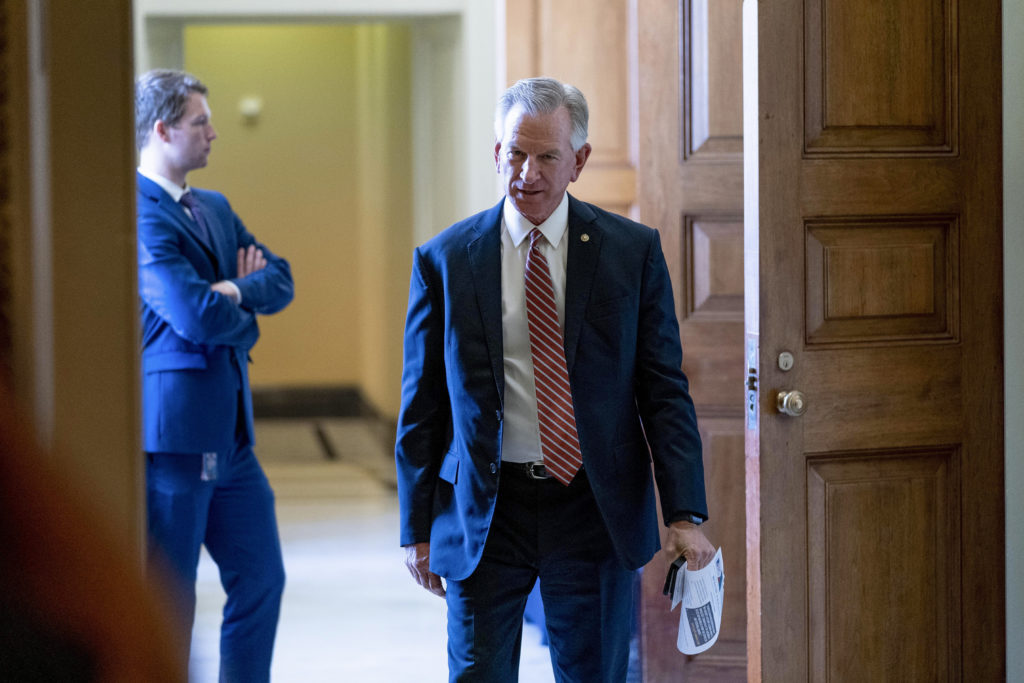
On Tuesday, U.S. Senator Tommy Tuberville spoke on the U.S. Senate floor to denounce climate alarmists and encourage increased production of American energy. Tuberville said that alarmists who claim that “we’re near the edge of a climate cliff” are making “a prediction they know is impossible to prove and has never come true.” Tuberville said that American energy is significantly cleaner than the majority of notable energy producers in the world and that the United States should expand domestic energy production to support our economy and lower energy costs for American families. “We should be doing everything we can to fix the problems created by the government and get Americans back on their feet by unleashing our economic potential and opening doors of opportunity,” Sen. Tuberville said. “Unfortunately, too many here in Washington are still focused on growing the size of government and adding regulations they say will save the environment. However, very rarely does making the government larger benefit the American taxpayers.” “For decades, fans of big government have used climate change warnings to grow their power,” Tuberville continued. “They have claimed we’re near the edge of a climate cliff — a prediction they know is impossible to prove and has never come true. Of course, they claim, the only solution to this cooked-up crisis is for you — the American taxpayer — to sacrifice even more of your freedoms to tackle this so-called climate dilemma.” “Well, I think I speak for most Americans when they say, ‘no way.’” Tuberville argued. “We should say no to overpriced electric cars that are made with cobalt processed and sold by China — and plugged into a charger that’s powered by fossil fuels anyway…No to fake meat products that taste as bad as their price and will eventually kill our livestock producers’ way of life…We say no to unreliable energy sources and the skyrocketing utility bills we’re seeing today because America cannot operate and achieve economic success without fossil fuels… And no to trillions and trillions of taxpayer dollars spent on an agenda that’s based only on the rantings of failed candidates like Al Gore and John Kerry, global elites at a ski resort, and a European teenager.” “Some may call me a climate change denier, so I want to be clear,” Tuberville added. “As a conservative, I believe in protecting our environment, conserving our natural resources, and doing what we can to make sure Americans live in a clean, safe environment in communities that will last for generations to come. But I do not believe that we need to give up our livelihoods, our way of life, our access to affordable food and energy because of false claims that we are years — just a few years away — from extinction.” Tommy Tuberville is serving his first term representing Alabama in the United States Senate after 40 years as a coach, teacher, and broadcaster. Tuberville is a member of the Senate Armed Services, Agriculture, Veterans Affairs, and HELP Committees. To connect with the author of this story or to comment, email brandonmreporter@gmail.com.
Steve Milloy: Joe Biden’s America-wrecking climate agenda

President Joe Biden is driving fossil fuel-powered America into a wall so that he can replace it with a “green energy”-powered America. The Biden administration euphemizes this as a “transition.” It is not. It’s just a collision that will result in America being totaled. Since Biden became president, he has done everything in his power to de-power America. On Day 1, he killed the Keystone XL Pipeline, halted new oil and gas drilling on public lands, and rejoined the Paris climate agreement, which commits America to cutting our greenhouse gas emissions but not China’s. Biden’s Environmental Protection Agency reinstated Obama-era rules to make it more expensive to produce oil and gas, issued rules to make internal combustion engine-powered cars more expensive, and gave “green” California the unprecedented (and probably unconstitutional) authority to dictate what kind of cars all Americans can drive. Biden has empowered the Federal Energy Regulatory Commission with the authority to block new oil and gas pipelines on the basis of climate concerns and is continuing to halt new oil and gas drilling on federal lands in defiance of a federal court order. These and many other anti-fossil fuel actions have raised gasoline prices roughly one dollar per gallon since Biden took office. Then Russia invaded Ukraine, exacerbating an ongoing global energy crisis (worsened by European climate policies). Gasoline prices have increased another 60 cents since the Ukraine invasion and are not likely to stop rising any time soon. Normally in response to such an energy crisis, a U.S. president might at least temporarily put aside an unpopular political agenda to ease supply issues and alleviate pain at the pump. Not Joe Biden. He is doing anything but that. Biden first announced during his State of the Union address that he and other allied nations were going to release 60 million barrels of oil from national strategic petroleum reserves around the world, including 30 million from the United States. While that sounds like a lot, it isn’t. Given that the world burns about 100 million barrels of oil per day, it’s hard to see how a 15-hour supply of oil is going to accomplish anything other than fooling people who don’t know any better. Instead of encouraging the American oil and gas industry to produce more gasoline – remember that the U.S. essentially controlled global oil prices under President Donald Trump’s “America First” policies – Biden has gone hat in hand to despotic regimes in Iran and Venezuela and to the unreliable governments of Saudi Arabia and the United Arab Emirates, asking them to produce more oil. Faced with the problematic politics of skyrocketing gas prices in a midterm election year, the president is desperately lashing out. He has falsely accused the U.S. oil industry of profiteering. White House Press Secretary Jen Psaki has incorrectly blamed the oil industry for failing to utilize existing leases on federal lands to produce more oil. Biden is even trying to point the finger at Vladimir Putin by promoting the Twitter hashtag #PutinPriceHike. The reason for not embracing the normal and reasonable solution to the current situation – allowing the U.S. oil and gas industry to produce as much as possible, as soon as possible – is that the Biden administration intends to use the gasoline crisis to advance its elitist climate agenda. Transportation Secretary Pete Buttigieg and Energy Secretary Jennifer Granholm, for example, are touting electric cars (average price $56,000) as the solution to rising gas prices. Biden’s green supporters are advocating more wind and solar as the solution to the ongoing energy crisis because, well, “never waste a crisis.” Adding insult to injury, John Kerry said he hoped, despite the invasion of Ukraine, that Putin would keep his eye on the climate ball. The result? Americans are made to suffer unnecessarily, and national security is imperiled, all for an agenda that is junk science-fueled and impractical, regardless of how you feel about United Nations’ “climate science.” This is not rational policy. It is intentional nation-wrecking. Steve Milloy publishes JunkScience.com and is the author of “Scare Pollution: Why and How to Fix the EPA.”
Joe Biden, ‘We can’t wait any longer’ to address climate crisis
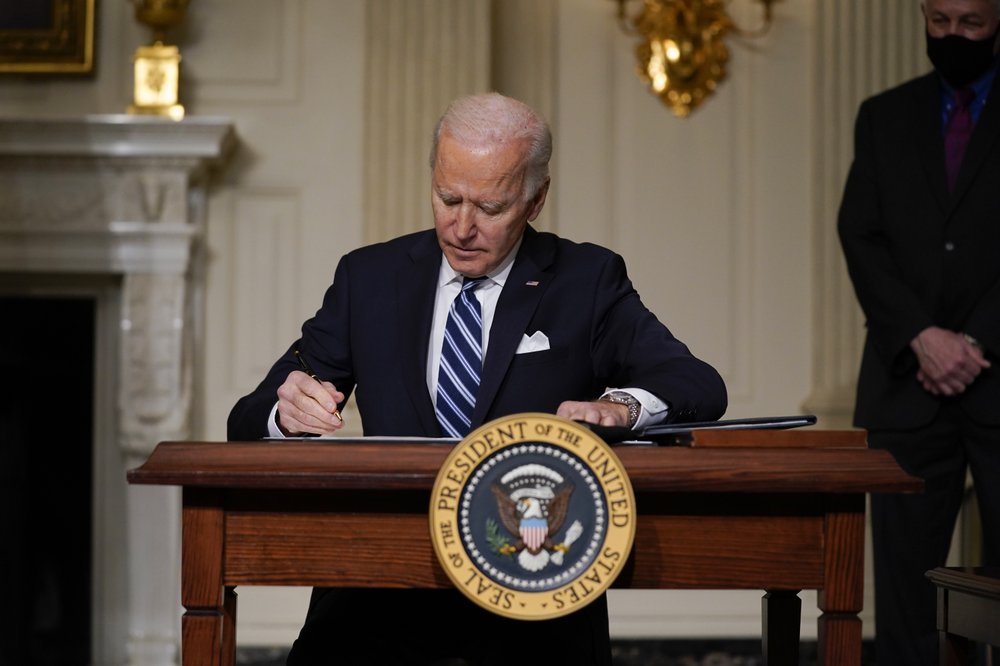
In the most ambitious U.S. effort to stave off the worst of climate change, President Joe Biden signed executive orders Wednesday to transform the nation’s heavily fossil-fuel powered economy into a clean-burning one, pausing oil and gas leasing on federal land and targeting subsidies for those industries. The directives aim to conserve 30 percent of the country’s lands and waters in the next 10 years, double the nation’s offshore wind energy, and move to an all-electric federal vehicle fleet, among other changes. Biden’s sweeping plan is aimed at staving off the worst of global warming caused by burning fossil fuels. But his effort also carries political risk for the president and Democrats as oil- and coal-producing states face job losses from moves to sharply increase U.S. reliance on clean energy such as wind and solar power. “We can’t wait any longer″ to address the climate crisis, Biden said at the White House. ”We see with our own eyes. We know it in our bones. It is time to act.″ He said his orders will “supercharge our administration’s ambitious plan to confront the existential threat of climate change.” Biden has set a goal of eliminating pollution from fossil fuel in the power sector by 2035 and from the U.S. economy overall by 2050, speeding what is already a market-driven growth of solar and wind energy and lessening the country’s dependence on oil and gas. The aggressive plan is aimed at slowing human-caused global warming that is magnifying extreme weather events such as deadly wildfires in the West and drenching rains and hurricanes in the East. Biden acknowledged the political risk, repeatedly stating his approach would create jobs in the renewable energy and automotive sectors to offset any losses in oil, coal, or natural gas. “When I think of climate change and the answers to it, I think of jobs,″ Biden said. “These aren’t pie-in-the-sky dreams. These are concrete actionable solutions. And we know how to do this.″ In a change from previous administrations of both parties, Biden also is directing agencies to focus help and investment on the low-income and minority communities that live closest to polluting refineries and other hazards, and the oil- and coal-patch towns that face job losses as the U.S. moves to sharply increase its reliance on wind, solar and other energy sources that do not emit climate-warming greenhouse gases. Biden pledged to create “millions of good-paying, union jobs” building electric cars, installing solar panels and wind turbines, and performing specialized work to cap abandoned wells, restore mine-scarred land and turn old industrial sites “into the new hubs of economic growth.″ Even so, Republicans immediately criticized the plan as a job killer. “Pie-in-the-sky government mandates and directives that restrict our mining, oil, and gas industries adversely impact our energy security and independence,″ said Rep. Cathy McMorris Rodgers of Washington state, the top Republican on the House Energy and Commerce Committee. Biden also is elevating the warming climate to a national security priority, directing intelligence agencies, the military, and others to do more to prepare for the heightened risks. The conservation plan would set aside millions of acres for recreation, wildlife, and climate efforts by 2030 as part of Biden’s campaign pledge for a $2 trillion program to slow global warming. President Donald Trump, who ridiculed the science of climate change, withdrew the U.S. from the Paris global climate accord, opened more public lands to coal, gas, and oil production, and weakened regulation on fossil fuel emissions. Experts say these emissions are heating the Earth’s climate dangerously and worsening floods, droughts, and other natural disasters. Currently, 61% of the nation’s electric power comes from natural gas and coal, 20% from nuclear, and 17% from wind, solar and other renewable energy, the U.S. Energy Information Administration says. Georgia Tech climate scientist Kim Cobb said that “if this Day 7 momentum is representative of this administration’s 4-year term, there is every reason to believe that we might achieve carbon neutrality sooner than 2050,” even as key roadblocks lie ahead. Biden’s actions came as his nominee for energy secretary, former Michigan Gov. Jennifer Granholm, faced deep skepticism from Republicans as she tried to pitch the president’s vision for a green economy. “The last Democratic administration went on a regulatory rampage to slow or stop energy production,” said Wyoming Sen. John Barrasso, a leading Republican on the Senate Energy and Natural Resources Committee. “I’m not going to sit idly by … if the Biden administration enforces policies that threaten Wyoming’s economy.″ Granholm, whose state was devastated by the 2008 recession, promoted emerging clean energy technologies, such as battery manufacturing, as an answer for jobs that will be lost as the U.S. transitions away from fossil fuels. Former Secretary of State John Kerry, now Biden’s climate envoy, said oil, gas, and coal workers “have been fed a false narrative″ that ”somehow, dealing with climate is coming at their expense. No, it’s not. What’s happening to them is happening because of other market forces already taking place.″ Instead of possible black lung disease, a miner would have a brighter future as a solar power technician, Kerry said. “The same people can do those jobs, but the choice of doing the solar power one now is a better choice.″ The oil industry said curtailing domestic production will lead to an increase in imported oil. “I don’t think any American wants to go back to the days of being held hostage to foreign entities that don’t have America’s best interest at heart as we lose American energy leadership,” said Mike Sommers, president of the American Petroleum Institute. Sommers and other industry leaders warned that states could lose hundreds of thousands of jobs and critical funding. Nearly one-third of New Mexico’s state budget comes from oil and gas, said Ryan Flynn, president of the New Mexico Oil and Gas Association. Biden’s directive to double energy production from offshore wind comes after the Trump administration slowed permit review of some giant offshore wind turbine projects. Significantly, he is directing agencies
‘America is back’: Joe Biden pushes past Donald Trump era with nominees
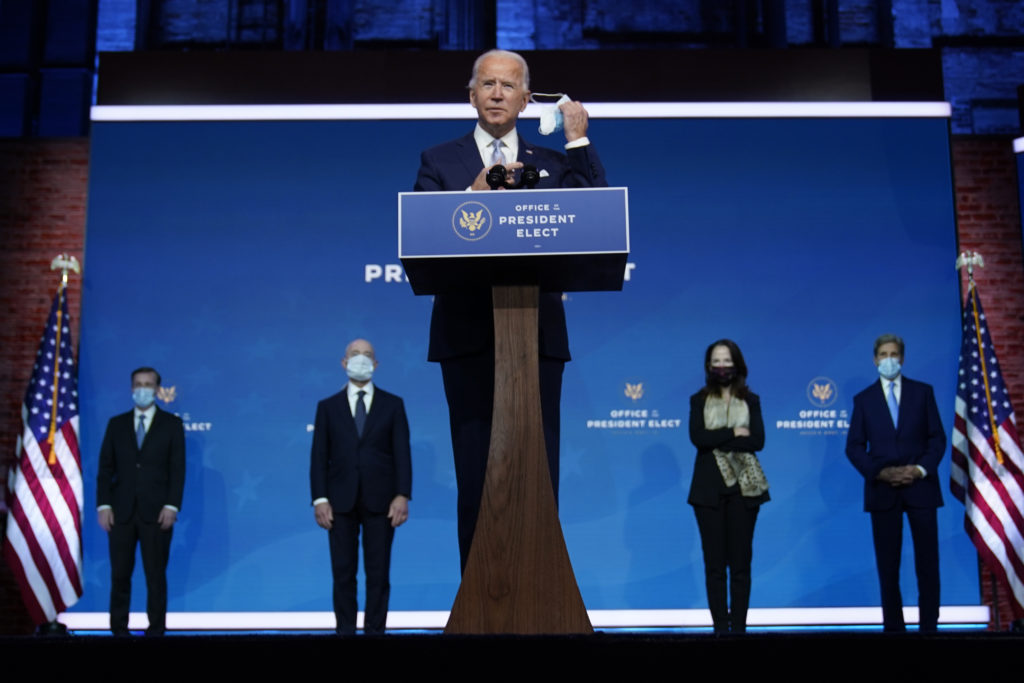
Declaring “America is back,” President-elect Joe Biden introduced his national security team on Tuesday, his first substantive offering of how he’ll shift from Trump-era “America First” policies by relying on experts from the Democratic establishment to be some of his most important advisers. “Together, these public servants will restore America globally, its global leadership and its moral leadership,” Biden said from a theater in his longtime home of Wilmington, Delaware. “It’s a team that reflects the fact that America is back, ready to lead the world, not retreat from it.” The nominees are all Washington veterans with ties to former President Barack Obama’s administration, a sign of Biden’s effort to resume some form of normalcy after the tumult of President Donald Trump’s four years in office. There are risks to the approach as Republicans plan attacks and progressives fret that Biden is tapping some officials who were too cautious and incremental the last time they held power. Still, Biden’s nominees were a clear departure from Trump, whose Cabinet has largely consisted of men, almost all of them white. Biden’s picks included several women and people of color, some of whom would break barriers if confirmed to their new positions. They stood behind Biden and Vice President-elect Kamala Harris spaced apart and wearing masks to prevent the spread of the coronavirus, a contrast with Trump and many of his top aides who have largely eschewed facial coverings. The president-elect’s team includes Antony Blinken, a veteran foreign policy hand well-regarded on Capitol Hill whose ties to Biden go back some 20 years, for secretary of state; lawyer Alejandro Mayorkas to be homeland security secretary; veteran diplomat Linda Thomas-Greenfield to be U.S. ambassador to the United Nations; and Obama White House alumnus Jake Sullivan as national security adviser. Avril Haines, a former deputy director of the CIA, was picked to serve as director of national intelligence, the first woman to hold that post, and former Secretary of State John Kerry will make a curtain call as a special envoy on climate change. Kerry and Sullivan’s position will not require Senate confirmation. With the Senate’s balance of power hinging on two runoff races in Georgia that will be decided in January, some Senate Republicans have already expressed antipathy to Biden’s picks as little more than Obama world retreads. Sen. Tom Cotton, an Arkansas Republican and potential 2024 presidential candidate, argued that Biden is surrounding himself with people who will go soft on China. Sen. Marco Rubio, another potential White House hopeful, who sits on the Senate Foreign Relations Committee that will consider Blinken’s nomination, broadly wrote off the early selections. “Biden’s cabinet picks went to Ivy League schools, have strong resumes, attend all the right conferences & will be polite & orderly caretakers of America’s decline,” Rubio tweeted. Biden said his choices “reflect the idea that we cannot meet these challenges with old thinking and unchanged habits.” He said he tasked them with reasserting global and moral leadership, a clear swipe at Trump, who has resisted many traditional foreign alliances. The president-elect said he was “struck” by how world leaders have repeatedly told him during congratulatory calls that they look forward to the U.S. “reasserting its historic role as a global leader” under his administration. Trump, who has debated recently whether to mount another presidential campaign in 2024, appeared to defend his worldview on Tuesday. “We shouldn’t go away from that — America First,” he said at the annual turkey pardon, a lighthearted pre-Thanksgiving White House tradition. While Trump expected total loyalty from his Cabinet and chafed at pushback from advisers, Biden said he expected advisers to tell me “what I need to know, not what I want to know.” Further drawing a contrast with Trump, Haines said she accepted Biden’s nomination knowing that “you value the perspective of the intelligence community, and that you will do so even when what I have to say maybe inconvenient or difficult.” Haines said she has “never shied away from speaking truth to power” and added, “that will be my charge as director of national intelligence.” Biden celebrated the diversity of his picks, offering a particularly poignant tribute to Thomas-Greenfield. The eldest of eight children who grew up in segregated Louisiana, she was the first to graduate from high school and college in her family. The diplomat, in turn, said that with his selections, Biden is achieving much more than a changing of the guard. “My fellow career diplomats and public servants around the world, I want to say to you, ‘America is back, multilateralism is back, diplomacy is back,’” Thomas-Greenfield said. Mayorkas, who is Cuban American, also offered a nod to his immigrant upbringing. “My father and mother brought me to this country to escape communism,” he said. “They cherished our democracy, and were intensely proud to become United States citizens, as was I.” But Mayorkas might pose the most difficult confirmation challenge from Biden’s early round of nominees. The Senate previously confirmed him in December 2013 by a party-line vote to be the deputy secretary of Homeland Security. The Senate was controlled by Democrats then, and all of the chamber’s Republicans voted against his confirmation mainly because he was then under investigation by the Obama-appointed inspector general in that department. At the time, the Senate historian’s office said it was unprecedented for the Senate to vote on a nominee who was under investigation. The inspector general, John Roth, found in March 2015 that Mayorkas, as director of the U.S. Citizenship and Immigration Services, appeared to give special treatment to certain people as part of the visa program that gives residency preference to immigrants who agree to invest in the U.S. economy. Meanwhile, there were signs on Tuesday that the stalled formal transition of power is now underway. Biden’s team now is in contact with all federal agencies, according to a transition official who spoke on condition of anonymity to describe developments that have not been announced. At the Pentagon, Kash Patel, chief of staff
Democrats make it official, nominate Joe Biden to take on Donald Trump

For Biden, who has spent more than three decades eyeing the presidency, the moment was the realization of a long-sought personal goal.
Joe Biden, DNC ink fundraising deal as he widens party influence

The joint fundraising pact that will allow wealthy donors to contribute up to $360,600 to the party’s fall campaign.
In Iowa, anxiety and unpredictability cloud caucus finish
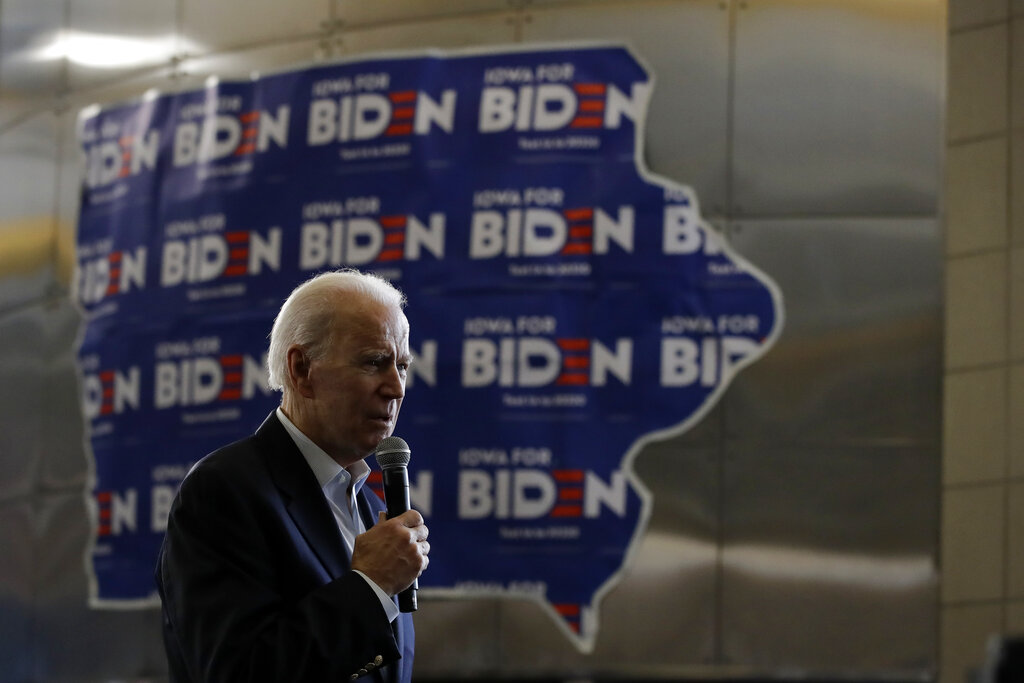
The Democratic race is unusually large and jumbled heading into Monday’s caucus.
Elusive Quest for Momentum is On as Democrats Dash to Iowa

No candidate is a clear leader as the Iowa caucuses draw near.
Bradley Byrne: Serious about corruption? Investigate the Bidens
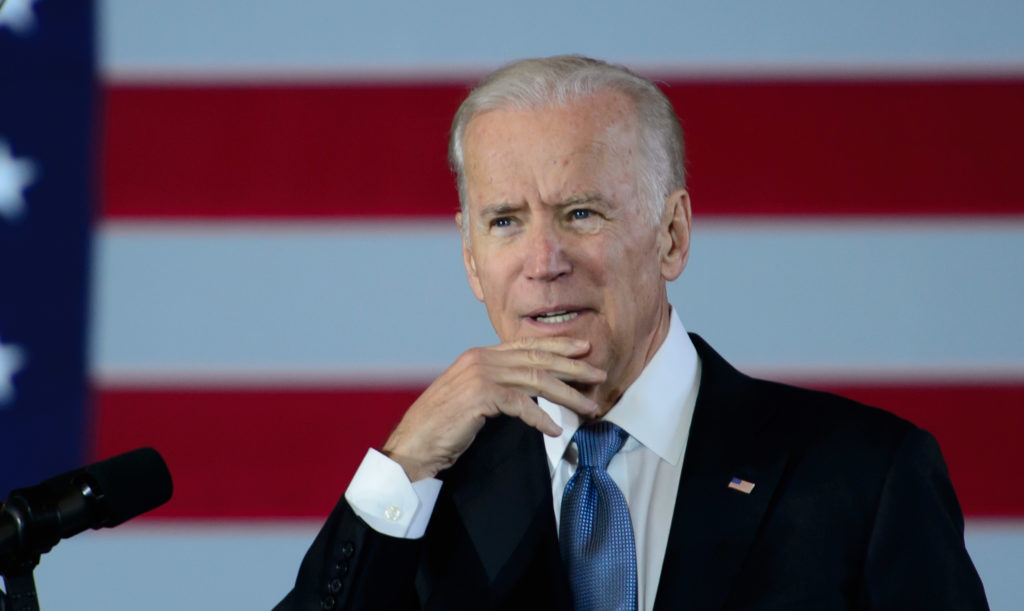
Speaker Nancy Pelosi, Adam Schiff, and their Democratic colleagues have spent countless hours and taxpayer dollars to find evidence that President Donald Trump was involved in corruption. At the same time, Democrats refuse to even consider the fundamental issue at hand – was President Trump right to question the activities of Hunter Biden in Ukraine? Months ago, media reported Hunter Biden’s shady business dealings. But, once impeachment began, the mainstream media moved to kill the story. We’re told nothing to see there. Yet each week, new information continues to emerge demanding a full investigation of the facts. We know that Hunter Biden essentially made his living as a high-powered lobbyist benefiting from his father’s career as a Senator and Vice President. When Joe was elected Vice President, Hunter claimed to leave lobbying, but really he just shifted his game. He formed a series of companies with Christopher Heinz, the stepson of Foreign Affairs Committee Chairman and later Secretary of State John Kerry. These kids, trading on their fathers’ names and political ties, made a pretty powerful combo. As the New York Times reported, Biden and Heinz pursued multiple foreign business investments “where connections implied political influence and protection.” These guys closed lucrative deals with China right after Hunter visited China on Air Force II with his father. Importantly, they were working in Ukraine while Joe was leading Ukrainian policy for the U.S to fight corruption. Ukraine is known for its corruption. A small group of oligarchs hold most political power. Hunter and his company went to work for one of these guys and his notoriously corrupt energy company, Burisma Holdings. Hunter was paid up to $50,000 a month to sit on its board. We know Hunter knew nothing about energy or Ukraine. But, when you’re dealing a with a corrupt country like Ukraine, and the son of the Vice President of the United States is involved in a corrupt company, that sends a signal to government officials when considering pursuing investigations. At the same time, Vice President Biden was threatening to withhold aid to Ukraine unless they fired the prosecutor allegedly looking into Burisma. Senior State Department officials raised concerns about Hunter to the Vice President. Yet, the arrangement continued until recently. The bottom line is that there are serious allegations here, they directly relate to impeachment, and Congress needs to find out what happened. In fact, I introduced a House Resolution 631 directing the relevant committees to investigate alleged Biden corruption. Despite having a substantial number of cosponsors, my resolution has been bottled up by Speaker Pelosi. Last week, Republicans on the Intelligence Committee echoed my resolution, requesting that if Hunter Biden is going to be the basis for impeachment, Congress should get his testimony in the impeachment inquiry. But, Democrats have signaled they won’t allow it. My question is, why? We know the answer – this is a partisan witch hunt against President Trump. President Trump never once demanded a quid pro quo from President Zelenksy. You can read the transcript yourself. While the Democrats and their allies in the press have trashed President Trump for raising Burisma and Ukraine’s role in the 2016 elections, those are serious issues worthy of investigation. I am proud to be a leader in the pressure campaign to expose the hypocrisy of the Democrats’ sham process. And I will continue leading the fight to investigate the Bidens and expose real corruption that may exist. If Democrats are serious about exposing corruption, investigating Hunter Biden cannot be ignored. One thing I’ve learned is that you can’t win a fight you don’t join. When you fight, good things can happen. That is why I am going to keep fighting, to make sure the truth is out there.
Donald Trump says he won’t let right to bear arms ‘be under siege’
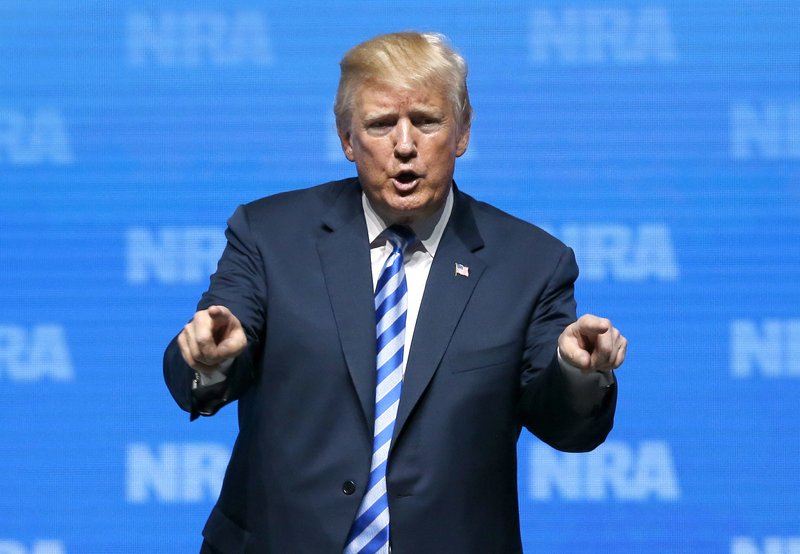
Months after the horror of the Parkland school shootings in Florida, President Donald Trump stood before cheering members of the National Rifle Association and urged them to elect more Republicans to Congress to defend gun rights. Trump claimed that Democrats want to “outlaw guns” and said if the nation takes that drastic step, it might as well ban all vans and trucks because they are the new weapons for “maniac terrorists.” “We will never give up our freedom. We will live free and we will die free,” Trump said Friday as he tried to rally pro-gun voters for the 2018 congressional elections. “We’ve got to do great in ’18.” Activists energized by shootings at schools, churches and elsewhere are also focused on those elections. In the aftermath of the February school shootings at Marjory Stoneman Douglas High School, which left 17 dead and many more wounded, Trump had temporarily strayed from gun rights dogma. During a televised gun meeting with lawmakers in late February, he wagged his finger at a Republican senator and scolded him for being “afraid of the NRA,” declaring that he would stand up to the group and finally get results in quelling gun violence. But he later backpedaled on that tough talk. He was clearly back in the fold at the NRA’s annual convention, pledging that Americans’ Second Amendment right to bear arms will “never ever be under siege as long as I am your president.” Trump briefly referenced the Parkland shootings in his speech, saying that he “mourned for the victims and their families” and noting that he signed a spending bill that included provisions to strengthen the federal background check system for gun purchases as well as add money to improve school safety. He also repeated his strong support for “letting highly trained teachers carry concealed weapons.” Trump’s speech in Dallas was his fourth consecutive appearance at the NRA’s annual convention. His gun comments were woven into a campaign-style speech that touched on the Russia probe, the 2016 campaign, his efforts in North Korea and Iran and his fight against illegal immigration. In strikingly personal criticism of members of Congress, he decried what he said were terribly weak immigration laws, declaring, “We have laws that were written by people that truly could not love our country.” While the president veered wildly off topic at times — speaking about entertainer Kanye West’s recent support and former Secretary of State John Kerry’s bicycle accident three years ago — he repeatedly returned to the message of the day: his support for the Second Amendment. Trump said some political advisers had told him attending the NRA convention might be controversial, but, “You know what I said? ‘Bye, bye, gotta get on the plane.’” Trump has long enjoyed strong backing from the NRA, which spent about $30 million in support of his presidential campaign. He was introduced by Vice President Mike Pence, who pointed to his own support for gun rights and accused the news media of failing to tell “the whole story” that “firearms in the hands of law-abiding citizens” make communities safer. One of the Parkland student survivors, David Hogg, criticized Trump’s appearance in advance. “It’s kind of hypocritical of him to go there after saying so many politicians bow to the NRA and are owned by them,” Hogg said. “It proves that his heart and his wallet are in the same place.” Back in February, Trump had praised members of the gun lobby as “great patriots” but declared “that doesn’t mean we have to agree on everything. It doesn’t make sense that I have to wait until I’m 21 to get a handgun, but I can get this weapon at 18.” He was referring to the AR-15 the Parkland shooting suspect is accused of using. Those words rattled some Republicans in Congress and sparked hope among gun-control advocates that, unlike after previous mass shootings, tougher regulations might be enacted. But after expressing interest in increasing the minimum age to purchase an assault weapon to 21, Trump later declared there was “not much political support” for that. He then pushed off the issue of age restrictions by assigning it to a commission. Gabrielle Giffords, the former Arizona congresswoman who was shot outside a grocery store during a constituent gathering in 2011, said Trump had “allowed his presidency to be hijacked by gun lobbyists and campaign dollars.” She said Trump had “ignored the pleas of young people demanding safer gun laws.” Republished with the permission of the Associated Press.
After close vote, panel sends Mike Pompeo nomination to Senate
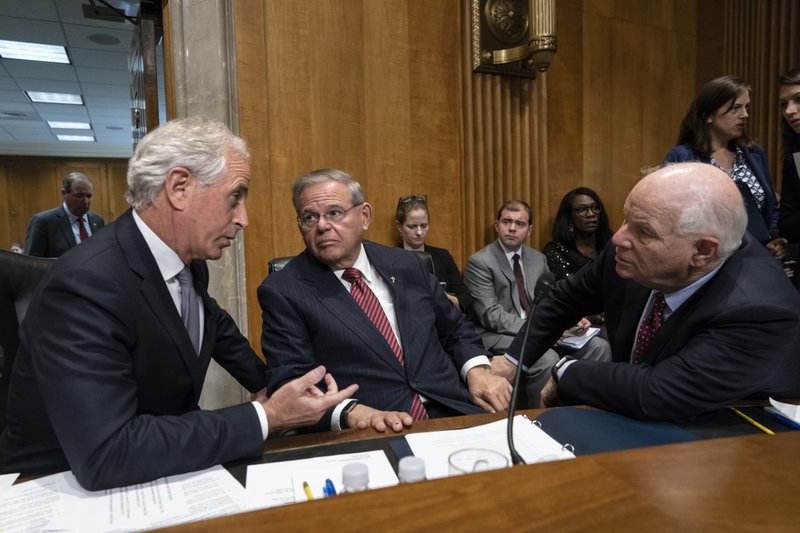
Mike Pompeo, President Donald Trump’s choice for secretary of state, avoided a rare rebuke Monday as the Senate Foreign Relations Committee narrowly recommended him, but the vote served as a warning shot to the White House as nominees to lead the CIA and Veterans Affairs are hitting stiff resistance. Pompeo, who’s now CIA director, received the panel’s approval only after Trump’s last-minute overtures to Sen. Rand Paul, R-Ky. Pompeo’s nomination now goes to the full Senate, where votes are tallying in his favor and Senate Majority Leader Mitch McConnell said he looks forward to voting to confirm him later this week. Trump has been quick to fire his top cabinet secretaries, but Senate Democrats are not so fast to confirm replacements. A grilling is expected Wednesday of Ronny Jackson, the White House physician nominated to head the VA, and Pompeo’s potential replacement at the CIA, Gina Haspel, is also facing scrutiny. It’s also a reminder of how tough it could be to replace Deputy Attorney General Rod Rosenstein. Trump has publicly mused about firing Rosenstein, who is overseeing special counsel Robert Mueller’s investigation into Russian interference in the 2016 election. “Hard to believe,” Trump tweeted Monday about what he called “obstruction.” ″The Dems will not approve hundreds of good people… They are maxing out the time on approval process for all, never happened before. Need more Republicans!” Republicans hold just a slim Senate majority, 50-49, with the prolonged absence of Sen. John McCain, R-Ariz. Pompeo’s bid to become the nation’s top diplomat was in the hands of a few senators, but received a boost Monday when two Democrats, Sen. Joe Manchin of West Virginia and Sen. Joe of Indiana, announced their support. Pressure is mounting on senators from all sides. White House allies are unloading ad campaigns against Democrats from Trump-won states, but progressive groups are pounding senators’ offices in opposition. As soon as Sen. Heidi Heitkamp, D-N.D., announced her support for Pompeo, one group called on her to switch. Ahead of the Foreign Relations Committee’s vote, chairman Bob Corker, R-Tenn., said of the full Senate, “It does appear Mike Pompeo has the votes to be secretary of state.” Supporters point to Pompeo’s resume as a West Point and Harvard Law School graduate who has the president’s confidence, particularly on North Korea. Opponents are focusing on his hawkish foreign policy views and negative comments about gay marriage and Muslims. Paul’s earlier objections to Pompeo, along with overwhelming opposition from Democrats, had set the secretary of state nominee on track to be the first since 1925, when the committee started keeping records, not to receive a favorable recommendation. But Trump and Paul talked repeatedly, including a chat just moments before the vote. “I have changed my mind,” Paul said, explaining he received reassurances that Pompeo agrees with the president that the Iraq war was a “mistake” and that it is time for U.S. troops to leave Afghanistan. Paul’s office said he “got a win” — the promise that Pompeo sides with Trump on those issues — out of the situation, but declined to provide details. “I want Trump to be Trump,” Paul said. Asked about Paul’s change of heart, Trump said, “He’s a good man.” Senators are anxious to have Pompeo in place before international meetings scheduled for later this week and ahead of North Korea talks. Republicans blamed partisan politics for opposition, saying Pompeo is just as qualified as past secretaries of state nominees Hillary Clinton or John Kerry, both of whom received overwhelming support. “A majority of Democrats continue their pointless obstruction to score cheap political points with their base as a willful attempt to undermine American diplomacy,” said White House spokeswoman Sarah Huckabee Sanders. But Democrats resisted easy confirmation of the nation’s top diplomat, and support peeled. Sen. Maggie Hassan, D-N.H., who had been among more than a dozen Democrats who supported Pompeo for CIA director, announced her no vote Monday. “I am concerned that Mr. Pompeo has not demonstrated an understanding that the Secretary of State has an obligation to the American people to stand up for our core values,” she said. Sen. Chris Coons, D-Del., who was among the last Democrats on the foreign relations panel to announce his no vote, said he is concerned that Pompeo “will embolden, rather than moderate or restrain” Trump’s “most belligerent and dangerous instincts.” In a late setback Monday, the panel was short one Republican vote needed for a favorable recommendation because Sen. Johnny Isakson was delivering a eulogy in his home state of Georgia. Rather than postpone voting until his return very late Monday, Coons agreed to allowed his vote to be recorded as “present” so the committee could finish its work. Republished with the permission of the Associated Press.
Mike Pompeo facing rare opposition from Senate panel
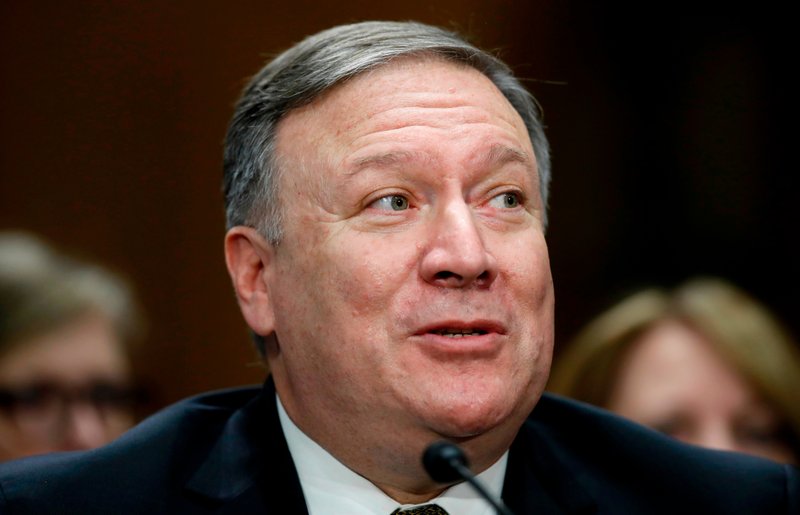
President Donald Trump’s nominee for secretary of state, Mike Pompeo, is facing serious opposition before the Senate Foreign Relations Committee, which may not have enough votes to recommend him for confirmation because all Democrats, and at least one Republican, have said they will oppose him. The full Senate is still expected to consider Pompeo’s nomination later this week. But the rare rebuke expected from the panel Monday, even after Pompeo’s recent visit with North Korean leader Kim Jong Un, would be the first time in years that a nominee for the high-level Cabinet position did not receive a favorable committee vote. Sen. Bob Corker, R-Tenn., the chairman of the committee, blamed partisan politics for opposition to Pompeo, now the CIA director, saying Pompeo is just as qualified as past secretaries of state nominees Hillary Clinton or John Kerry, both of whom received overwhelming support. “We are in an era where somebody like this, who is qualified, unfortunately, is likely to be voted out without recommendation or with a negative recommendation,” Corker said Sunday on “State of the Union” on CNN. “It’s just sad that our nation has devolved politically to this point.” Pompeo’s confirmation before the full Senate now hangs in balance, with the votes of just a handful of senators determining whether he becomes the nation’s top diplomat after Trump fired Rex Tillerson last month. Key Democrats, including some who had voted for Pompeo as CIA director last year, are peeling away, and Republican Sen. Rand Paul of Kentucky remains opposed, despite personal overtures from the president. Pressure is mounting on senators from both sides. White House allies are unloading ad campaigns against Democrats from Trump-won states, including North Dakota, Indiana and Missouri, to vote for the president’s nominee. But progressive groups are pounding senators’ offices in opposition to Pompeo’s hawkish foreign policy views and negative comments about gay marriage and Muslims. As soon as Sen. Heidi Heitkamp, D-N.D., announced her support last week, one group called on her to switch. “I don’t agree with every position he’s taken or every word he has spoken,” Sen. Susan Collins, R-Maine, said Sunday on “Meet the Press” on NBC. “But I believe he has an extensive knowledge of world affairs that has been enhanced by his time at the CIA.” Sen. Maggie Hassan, D-N.H., who met with the nominee last week, “has concerns about Mr. Pompeo’s nomination to serve as secretary of state,” said spokesperson Ricki Eshman. The senator “is reviewing his record before making a final decision.” In the committee, the opposition has been building ahead of Monday’s session. Sen. Chris Coons, D-Del., who was among the last Democrats on the panel to announce his no vote, said he’s is concerned that Pompeo “will embolden, rather than moderate or restrain” Trump’s “most belligerent and dangerous instincts.” “I do not make this decision lightly or without reservations,” Coons said in a statement Friday. “However, I remain concerned that Director Pompeo will not challenge the President in critical moments. On vital decisions facing our country, Director Pompeo seems less concerned with rule of law and partnership with our allies and more inclined to emphasize unilateral action and the use of force.” Rather than allow an unfavorable vote on the panel, where Republicans have a one-seat majority, senators could choose not to issue a recommendation if Pompeo cannot find enough backing. The committee action won’t necessarily stall Pompeo’s confirmation before the full Senate, but it would be an unusual setback not seen since the panel took a pass on John Bolton, President George W. Bush’s pick for ambassador to the United Nations. Sen. Tom Cotton, R-Ark., who has been among Pompeo’s most vocal champions in the Senate, lambasted his colleagues ahead of voting. “Democrats, especially on the Foreign Relations Committee, are really engaged in shameful political behavior,” Cotton said Sunday on CBS’ “Face the Nation.” But several Democratic senators who supported Pompeo for CIA director say Pompeo’s views are not reflective of those they want in the top diplomat. Republished with the permission of the Associated Press.


